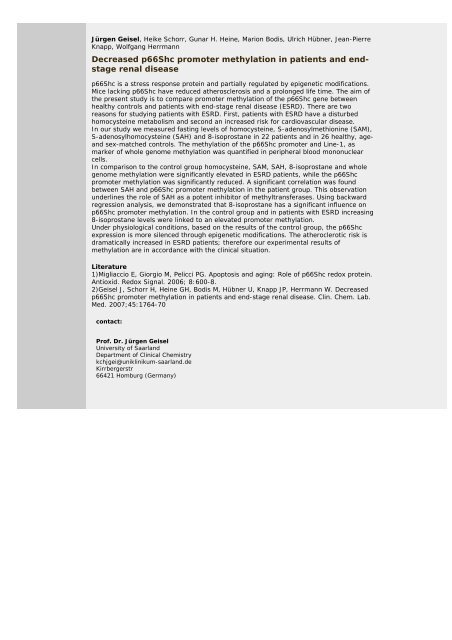Abstracts (poster) - Wissenschaft Online
Abstracts (poster) - Wissenschaft Online
Abstracts (poster) - Wissenschaft Online
You also want an ePaper? Increase the reach of your titles
YUMPU automatically turns print PDFs into web optimized ePapers that Google loves.
Jürgen Geisel, Heike Schorr, Gunar H. Heine, Marion Bodis, Ulrich Hübner, Jean-Pierre<br />
Knapp, Wolfgang Herrmann<br />
Decreased p66Shc promoter methylation in patients and endstage<br />
renal disease<br />
p66Shc is a stress response protein and partially regulated by epigenetic modifications.<br />
Mice lacking p66Shc have reduced atherosclerosis and a prolonged life time. The aim of<br />
the present study is to compare promoter methylation of the p66Shc gene between<br />
healthy controls and patients with end-stage renal disease (ESRD). There are two<br />
reasons for studying patients with ESRD. First, patients with ESRD have a disturbed<br />
homocysteine metabolism and second an increased risk for cardiovascular disease.<br />
In our study we measured fasting levels of homocysteine, S-adenosylmethionine (SAM),<br />
S-adenosylhomocysteine (SAH) and 8-isoprostane in 22 patients and in 26 healthy, age-<br />
and sex-matched controls. The methylation of the p66Shc promoter and Line-1, as<br />
marker of whole genome methylation was quantified in peripheral blood mononuclear<br />
cells.<br />
In comparison to the control group homocysteine, SAM, SAH, 8-isoprostane and whole<br />
genome methylation were significantly elevated in ESRD patients, while the p66Shc<br />
promoter methylation was significantly reduced. A significant correlation was found<br />
between SAH and p66Shc promoter methylation in the patient group. This observation<br />
underlines the role of SAH as a potent inhibitor of methyltransferases. Using backward<br />
regression analysis, we demonstrated that 8-isoprostane has a significant influence on<br />
p66Shc promoter methylation. In the control group and in patients with ESRD increasing<br />
8-isoprostane levels were linked to an elevated promoter methylation.<br />
Under physiological conditions, based on the results of the control group, the p66Shc<br />
expression is more silenced through epigenetic modifications. The atheroclerotic risk is<br />
dramatically increased in ESRD patients; therefore our experimental results of<br />
methylation are in accordance with the clinical situation.<br />
Literature<br />
1)Migliaccio E, Giorgio M, Pelicci PG. Apoptosis and aging: Role of p66Shc redox protein.<br />
Antioxid. Redox Signal. 2006; 8:600-8.<br />
2)Geisel J, Schorr H, Heine GH, Bodis M, Hübner U, Knapp JP, Herrmann W. Decreased<br />
p66Shc promoter methylation in patients and end-stage renal disease. Clin. Chem. Lab.<br />
Med. 2007;45:1764-70<br />
contact:<br />
Prof. Dr. Jürgen Geisel<br />
University of Saarland<br />
Department of Clinical Chemistry<br />
kchjgei@uniklinikum-saarland.de<br />
Kirrbergerstr<br />
66421 Homburg (Germany)

















